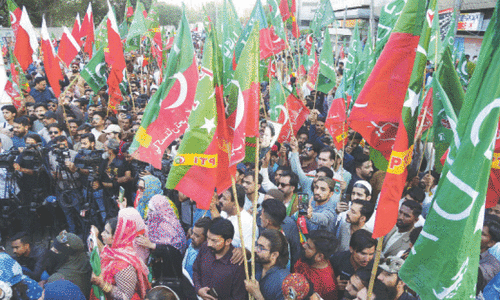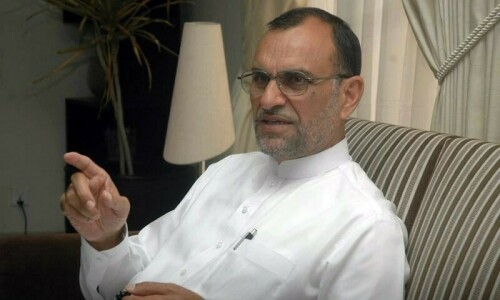KARACHI: Social reformer and voice of the peasants of Sindh Qazi Faiz Mohammed’s 33rd death anniversary was observed amid much fanfare and a tribute to the iconic figure was organised at the open-air theatre of the Arts Council of Pakistan on Tuesday.
A lawyer by profession, Qazi Faiz dedicated his life towards fighting for the marginalised and the downtrodden, and yet that was merely a fraction of what his life represented. He was a politician, an esteemed novelist, a proponent of secularism, and a profound lover of classical and Sufi music. The ceremony organised to mark his various contributions was an apt summary of Qazi Faiz’s two great loves; it started with a social and political dialogue, and ended on a musical note.
Human rights activist Asma Jahangir presided over the occasion and spoke about the significance of the many battles Qazi Faiz took up. “I was optimistic that at Qazi Faiz sahib’s death anniversary there would be a large representation of the haris [landless peasants]; however, that is not the case.”
She also spoke about the importance of remembering the contributions of past reformers and thinkers who were also part of the political arena. According to her, their ideals and integrity have been forgotten, as is evident from the situation the country finds itself in.
“By studying the lessons taught by men like Qazi Faiz, we can finish off the feudal mindset that is rampant in the country, be it in politics or in the cricket field,” she said. “We are slaves to this mindset and are unable to think beyond out towns, our provinces or even our country.”
Prof Dr Syed Jaffar Ahmed, director of the Pakistan Study Centre, shed light on the political life of Qazi Faiz. According to Dr Jaffar, Qazi Faiz was “a political figure who deserved being in the political arena as he conveyed a distinct vision of politics which centred around the principles of helping people, love for one’s country, and extending equal rights to each and every person. A democrat and a secularist, Qazi Faiz was born at the time of slavery and fought all his life against this reality.”
As a student Qazi Faiz took part in many demonstrations that are at the centre of our political history, said Dr Jaffar. One such was his involvement in the Khilafat movement. Another example was him being part of protests against the Simon Commission between 1928 and 1929.
“However, his most significant association was with the Sindh Hari Committee, which saw him take a stand against the Sindh jagirdari system,” he said.
Dr Jaffar also praised the organisers for such an important event and encouraged them to host similar seminars in all the provinces of Pakistan.
Qazi Faiz’s son, Javed Ahmed Qazi was also present at the ceremony and spoke about the moment when his father was awarded the ‘Friends of Liberation War Honour’ for raising his voice during the war in 1971.
In contrast to the other speeches, Javed Qazi’s was an impassioned one that had him, and many in the audience, in tears. “I am proud to say the issues my father gave importance to and fought for all his life, were important ones.”
He also alluded to the times his father was jailed and how his mother took care of the family in his absence. All these were part of the many contributions that Qazi Faiz professed, alongside the principles of equality and harmony among all religions.
A documentary was also aired in which old snapshots from the life of Qazi Faiz were displayed and testimonials by several of his contemporaries and juniors were included.
The musical line-up that paid homage to Qazi Faiz included performances by Sheema Kermani, Shafi Fakir, Saif Samejo, Fakirs of Shah Bhitai, Fakir Jamaluddin of Daraza Sharif and Fakirs of Jhok Sharif.
Published in Dawn, October 14th, 2015
On a mobile phone? Get the Dawn Mobile App: Apple Store | Google Play















































